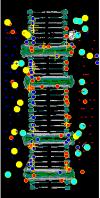| |
Integrative biology is a new science, which
development goes with difficult and specific theoretical difficulties
stemming from mathematics, physic and biology. It deals with
the integrate description of many phenomenon which take place
in the different levels of the structural and functional hierarchical
organizations of the living (interlocking of Russian dolls).
So it requires a new specific mathematical formalism, able
to go through the organization's levels.
Life of a living organism comes down to a
set of interactions of many elementary mechanisms which unrolled
themselves at the right moment, in the right place (they are
said "spatiotemporals").
Each "encoding" in the living is therefore spatiotemporal.
These mechanisms are functional since they tally with z certain
physiological function. When this one is disturbed, it is
said pathological.
Which datas characterize those mechanisms ?

- First of all, they are built on a physical structure,
namely a set of molecules. For example, it will be a neurone
which will act on a neurone, or a gland which will act on
other cell via a molecule, the hormone. The complexity of
an organism is due to the "integrate" construction
of many mechanisms.
- Then, the elementary mechanism might come from physic,
like the ionic transport through a membrane. It also results
from the combination of many physical laws as the matter
and the electric charge conservation.
- But a delayed action on other physical structure may
also happen : at that point difficulties appear which make
the biological system a very complex system. In fact, the
notion of function appears when a physical structure act
at e distance on other one, with, therefore, a certain extension.
It's a matter of functional interaction which fulfils physical
laws.
 The
quantitative determination of these actions (or relations
between physical structures) is the subject of experimental
physiology. At Claude Bernard's time, it was called general
physiology. The
quantitative determination of these actions (or relations
between physical structures) is the subject of experimental
physiology. At Claude Bernard's time, it was called general
physiology.
So as to sum up and enlighten the situation,
I will use the expression anatomical structure for the physical
structure, in other words, a molecules arrangement in the
physical space, for example, a neurone localized in a brain's
place. I will call functional interaction the elementary action
of a structure on other one. Consequently, integrative physiological
difficulties will be: :
- 1) The identification of
the anatomical structures able to act on other anatomical
structures ;
- 2) The determination of
these actions (quantitative relations) ;
- 3) The re-construction of
a physiological function from its elementary interactions.
Points 1) andt
2) are subjects of experimental
integrative biology.
Point 3) is the one of computational*
and theoretical integrative biology*.
The question asked is how reach these objectives…...
*
The topical trend is also to call this field "bioinformatics",
term that I consider inappropriate to denote integrative biology.
To me, bio computer scientists have more a reductionnist approach
than an integrative, pure bioinformatique rather than mathematical.
This only leads us to quasi-automatics connections (determination
of relations by systematic study of sets of datas). This may
appear to someone as integration… but it's not one. (read
in particular the letter I sent to the monthly La Recherche,
in reaction to the article: "Où va la biologie?"
By Evelyn Fox Keller (La Recherche, juin, n°376, p.30),
letter published in the n°378 of September 2004).
 back
back   Read more
Read more
|
|

